Tracking the key performance indicators (KPI) that give you an understanding of your business’s overall health is critical to ensuring your company is in a position to grow.
But for some small business owners, that can be difficult. It’s all too easy to get buried in the day-to-day and lose track of the big picture.
According to a survey by Geckoboard, almost 50% of small businesses don’t even identify the key performance indicators that they should be tracking.
The study shows that it affects their business, too, whereas companies that tracked KPIs were shown to be twice as likely to hit their growth targets.
Why are so many small business owners failing to track their key growth metrics?
Often, small business owners founded their companies due to their knowledge of their particular industry. Choosing and integrating KPI tracking tools requires technical know-how that may be out of their wheelhouse.
KPI tracking by hand, using templates, really isn’t a good long-term solution. The truth is that most small business owners know that they should be tracking key indicators, but the right tool hasn’t presented itself.
Small business owners want a simple solution. They want an all-in-one software that plugs right into the pulse of their business, helping them understand what they should be tracking and how to track it with as few interruptions as possible.
The good news?
Some tools can provide exactly that, but it depends on your company’s specific needs. Below are a few outstanding KPI measurement tools you can use to help alleviate your KPI problems, along with a few of the key metrics you should be tracking.
KPIs All Businesses Should Be Tracking
A business’s KPIs will differ depending on business models, industries, strategies, and goals. However, there are baseline metrics you need to be tracking no matter what kind of business you are running.
1. Customer Acquisition Cost (CAC)
This indicator tells you how effective your marketing and sales processes are and is the key to understanding the ROI you get from each customer acquisition channel your business uses.
Tracking your CAC answers the question: How much does it cost you to acquire a new customer through your marketing efforts?
2. Customer Lifetime Value (CLTV or LTV)
This indicator tells you:
- How much will a single customer spend at your business over the lifetime of their account?
- Do people tend to come back and buy from you more than once?
- Are you doing a good job of upselling your current customers?
It’s simple math. Your LTV must exceed your CAC for your company to be operating profitably.
3. Revenue Growth Rate
This indicator tells you how fast your business is growing.
Your revenue growth rate measures how quickly (or slowly) your revenue is increasing. This metric is important for projecting future growth and spending and helping business owners to make informed decisions.
These are the bare essentials, but depending on the type of company, there may be other metrics you should also be tracking. For example, SaaS (software-as-a-service) companies should track user metrics and churn rates. E-commerce companies should track conversion rates, cart abandonment rates, and average order value.
Figuring out the baseline metrics you should target is a good first step in setting up your own KPI tracking systems.
KPI Measurement & KPI Tracking Tools
Luckily for small businesses, several affordable tools can plug directly into the most popular business software solutions, making KPI tracking simple.
Depending on your business model and industry, some of these solutions might better fit.
Here are 5 of the top KPI tools:
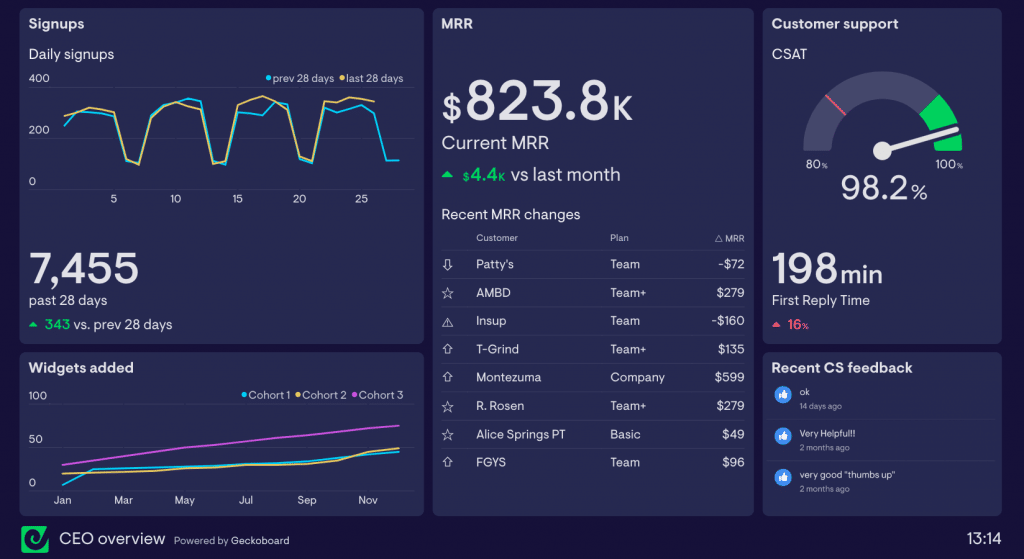
1. Geckoboard
Geckoboard provides a snazzy live KPI tracking dashboard for businesses. It features a drag-and-drop interface, allowing users to design visual dashboards across various metrics.
Geckoboard allows you to display full-screen dashboards on a TV screen and is an excellent choice for companies that want to keep their teams laser-focused on results.
Designed for fast-moving teams struggling to focus on the most important parts of their business, Geckoboard integrates with all the most popular business software, including Google Analytics, Salesforce, and Shopify.
The software pulls data from those programs (or Excel spreadsheets) to create beautiful visualizations of your most important metrics. While it isn’t as deep as other solutions on this list, it is perhaps the simplest to set up and use.
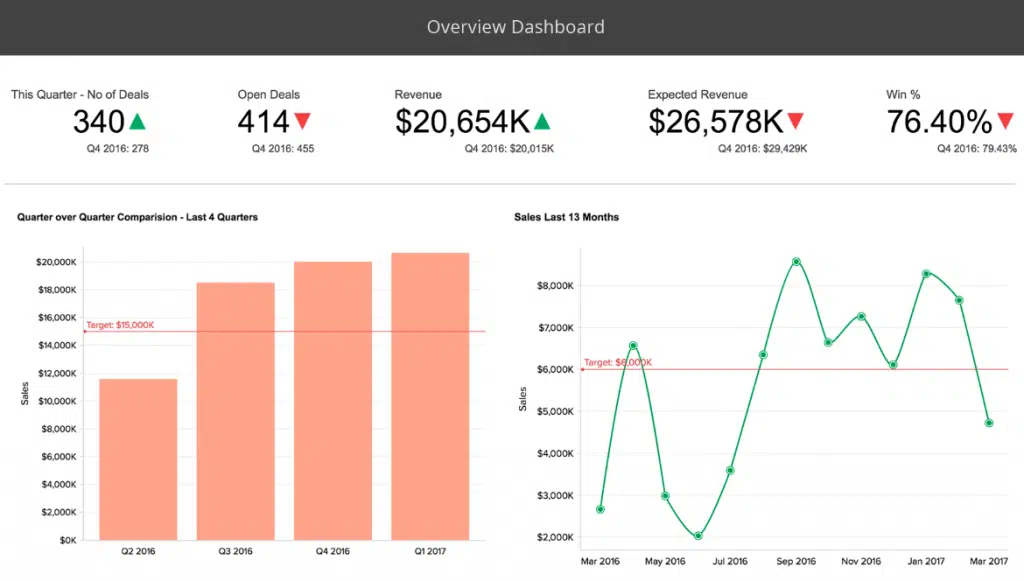
2. Zoho
Zoho is one of the most popular solutions for KPI tracking. While there is a bit of a learning curve, Zoho allows you to build personal dashboards for your business or every employee.
If you want to ensure that each of your teams stays focused on the most important business metrics, there is no better solution than Zoho.
Their website can look intimidating, as they have products for every facet of a business, including marketing, sales, community, services, project planning, and commerce.
You’ll have to take some time to sift through the different options they offer and find the perfect mix of software packages for your company, but you’ll be hard-pressed to find a more powerful solution for any business, big or small.
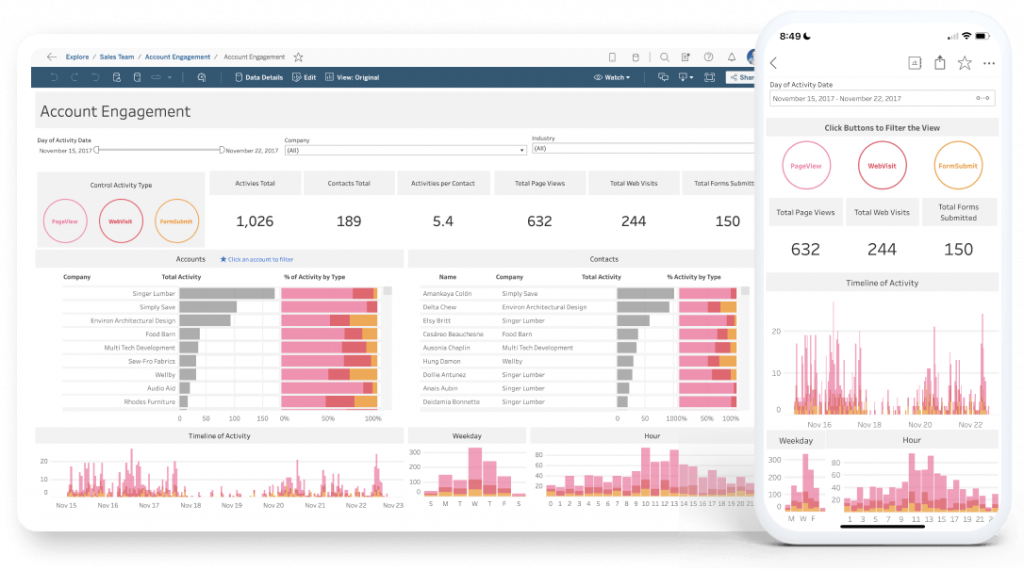
3. Tableau
Tableau is an excellent analytics and KPI tracking tool with a range of excellent pre-built KPI templates that you can use to track your own business.
Tableau is built specifically with retail and eCommerce operations in mind but does offer a wide range of features that any business would find useful.
There is one feature that sets Tableau apart from the competition — real-time data blending.
Tableau connects directly to your business databases and then develops insights in real-time. It can also blend data from various sources, pulling from Salesforce, Analytics, or Excel. Then, the system combines data to create informative and actionable insights into your company’s health.
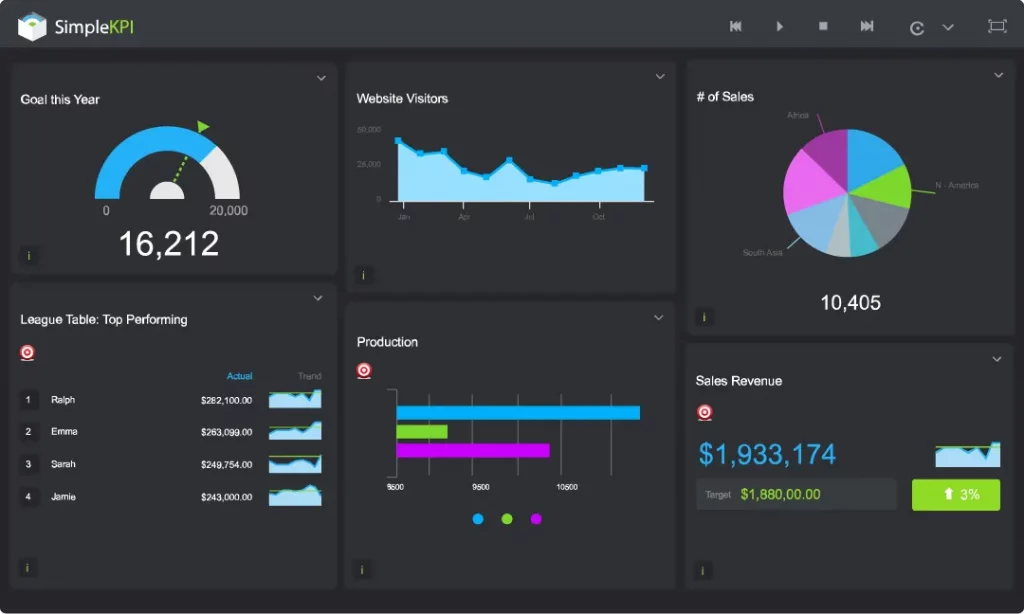
4. SimpleKPI
SimpleKPI is a great starting point for businesses that want to start tracking vital metrics with KPI tools. As the name would suggest, the software is designed to be incredibly simple and easy to use.
Don’t mistake that simplicity for lack of power, though. SimpleKPI can track a wide range of metrics, including financial, marketing, operational, and service metrics.
It is a complete package and suitable for businesses in almost any industry.
SimpleKPI integrates with several popular software packages and offers 24/7 support to its customers. Like Geckoboard, SimpleKPI also features a full-screen option to display KPIs to your teams in real-time.
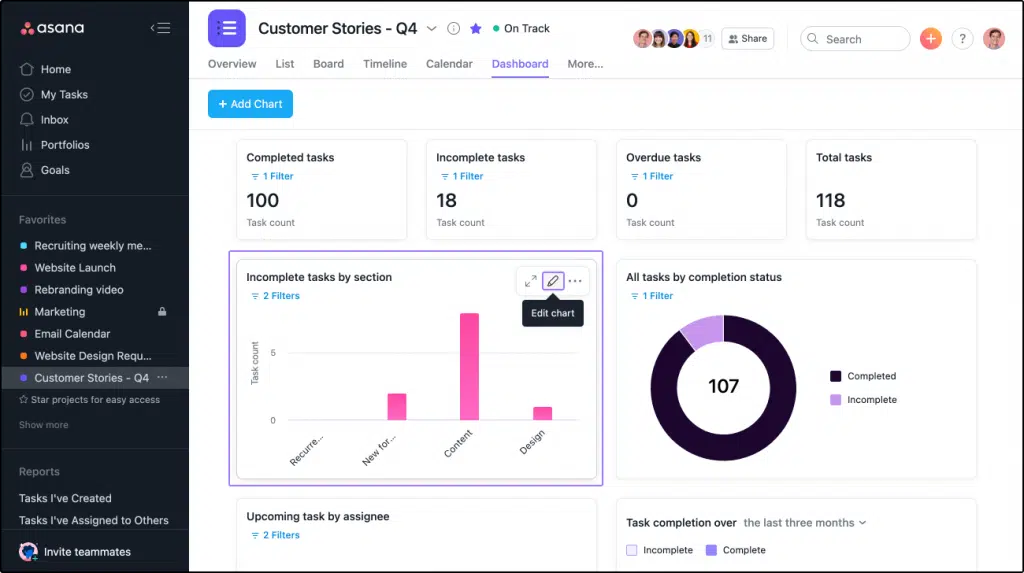
5. Asana
Asana is an excellent tool for simple, project-based KPI tools. As a complete project management system, Asana allows you to track tasks, projects, conversations, and dashboards.
The different projects in Asana are tracked within their “card” system. Within each card, you can create mission objectives and due dates and add team members responsible for completing the tasks.
In Asana, they refer to their KPI tracking system as “OKR,” which stands for Objectives and Key Results. In the OKR system, administrators can create tasks with objectives attached to them.
Their dashboard provides you with a range of tactical overviews that you can use to track your progress across each of your projects.
Why You Need KPI Tools
Running your own small business is hard. You’re constantly pulled in a million different directions, often leading you to neglect some of the most important aspects of your business.
Effective KPI measurement tools allow you to keep your thumb on the pulse of your business and understand where you need to improve without having to ingratiate yourself in every aspect of your daily operations.
Most business owners know that they should do a better job tracking their internal metrics. One of the biggest roadblocks is knowing what tools to use to make this daunting task easier. The tools above are a great place to start.
Editor’s Note: This article is part of the blog series Run Your Business brought to you by the marketing team at Unitel, the virtual phone system priced and designed for startups and small business owners.






